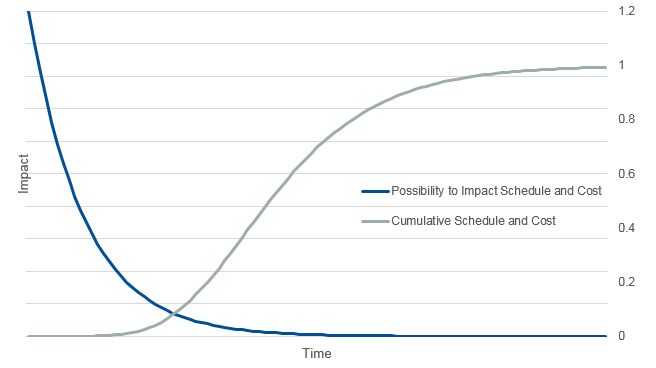“The project is delayed.” Not a great thing to hear when the opportunity to get a new product to market has a small window or your company has sales commitments to satisfy. Delays could mean the loss of market share, failure to grow, or complete loss of market access. In addition, delays can result in additional project costs related to changing market conditions, redesign costs, and/or team mobilization costs.
Potential delays are common and occur due to a variety of causes at each project stage. Some of the most common causes by phase include:
Predesign
- Problems securing funding
Design
- Review process issues
- Redesign process when bids exceed budget
Construction
- Contractor mobilization
- Equipment availability or delivery delays
- Inclement weather
- Unforeseen/hidden conditions
Regulatory
- Zoning approval holdups
- Plan review issues
- Construction permitting process
- Construction inspection process
- Licensing review issues
There is no perfect method to eliminate all schedule delays, but a knowledgeable project team of architects and engineers can help eliminate or reduce many of them. Each one of these delays represents a risk to the project. One effective way to deal with these risks is to create a risk register to evaluate and manage the risk. The project team can organize the potential sources of delay based on likelihood and potential impact. The following is an example based on common sources of delay:

When the risk register is established, it is easy to identify which sources of delay are likely to have the greatest impact based on the source rank. The project team can then work together to address each item, with special focus on the sources with the highest rank.
To optimize the effectiveness of a risk register, it is critical that the project owner share as much detailed information with the project team as possible. This helps the team properly prioritize the risks and optimize the outcomes. Many studies have shown early decisions or information can have the greatest impact on cost and schedules. For example, if project budget has the highest source rank in the risk register, a clear understanding of the project budget will help the team stay focused on that issue.

These curves show that the later information is provided or the later a decision is made, the less impact the decision will have on cost. In the example risk register, the largest risk of delay is redesign if bids exceed budget. Early information on the project budget can allow the design team to develop the most appropriate design within the allotted budget, which in turn can help avoid schedule delays. However, this approach will not always prevent issues with project costs exceeding budget. A significant shock to the market (such as a pandemic or new tariffs) can have unanticipated effects on the cost of any project.
Regardless of the approach the project team uses to address potential schedule delays, it is important to recognize how these could impact the project. Early identification and mitigation will generally result in an optimal project outcome.

